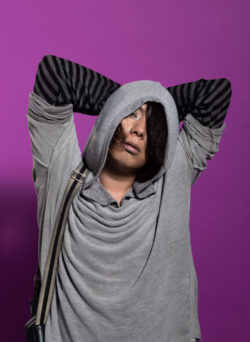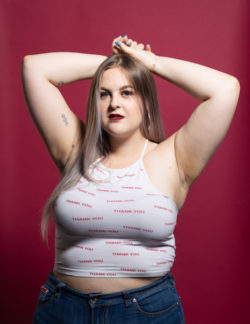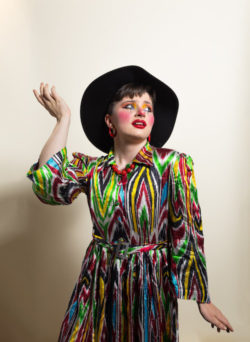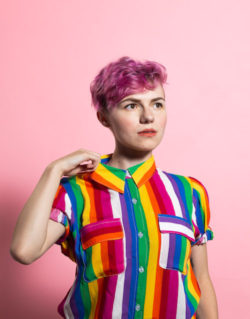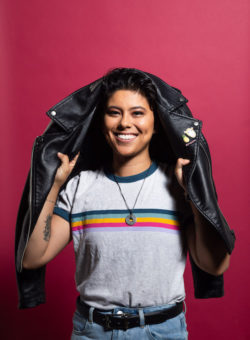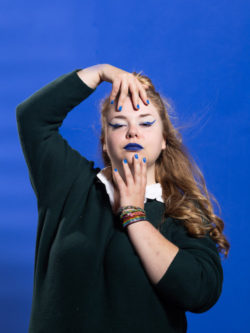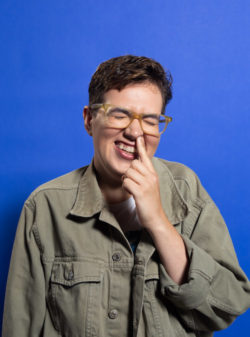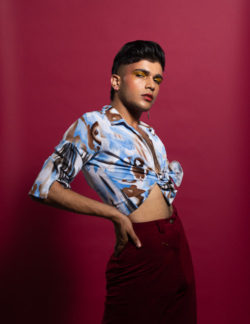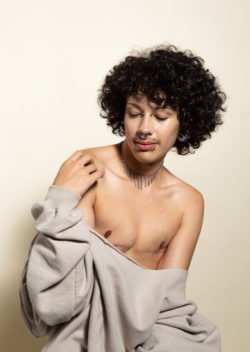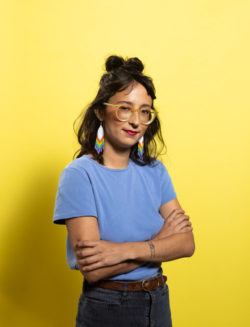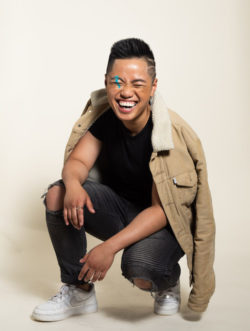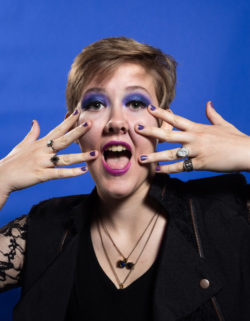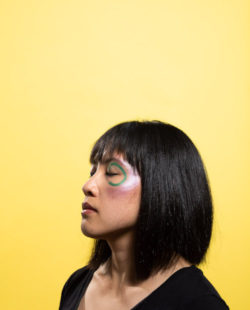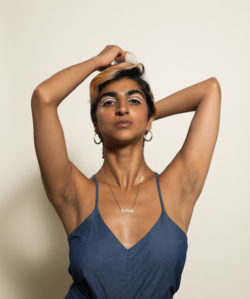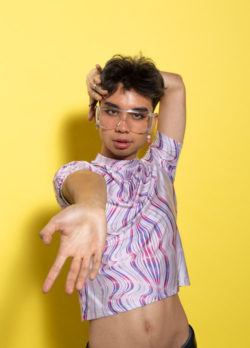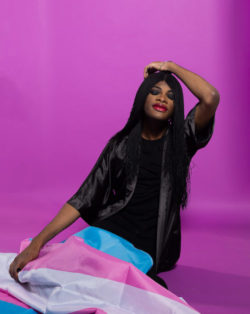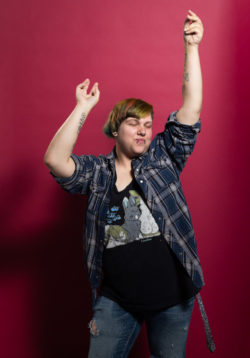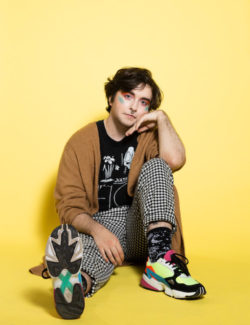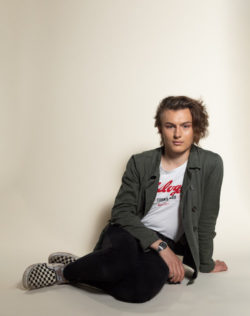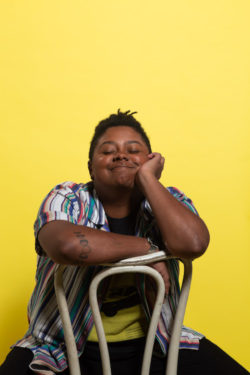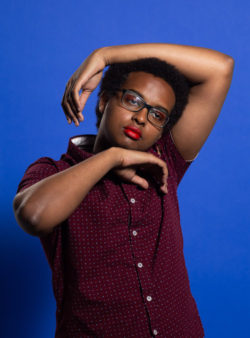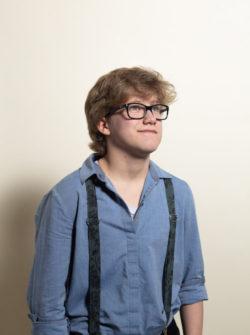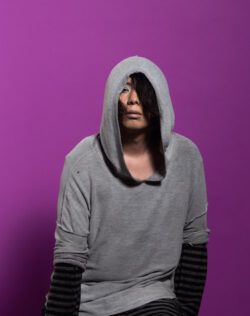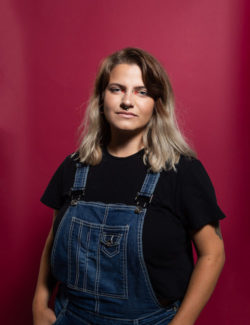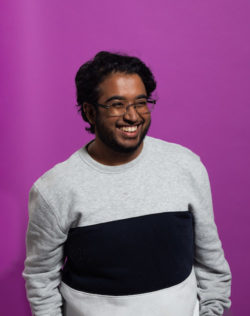We are an inter-agency committee serving LGBTQ2S+ youth & promoting increased understanding, empathy, and knowledge
Rainbow Alliance for Youth of Edmonton
A space of tools and resources for LGBTQ2S+ youth
Tender Queers is a photo project intended to highlight the community, resiliency, and joy of queer and trans youth in Edmonton.
-
Ashley: I’ve more or less always felt this way. I remember being 5 looking up at men and thinking like “I will never grow up into that”. I’ve always sort of androgynous like I remember being a little kid and always being asked if I was a boy or a girl. I just decided especially recently now that it’s becoming more accepted looks like maybe I am a girl. Like I can’t see myself growing up into.
Autumn: How do you feel when you’re feeling your best. Like when you feel most comfortable in your gender?
Ashley: I don’t think I’ve even experienced state yet because I’m always in stealth mode. I spent a summer in Toronto but when I was in Toronto. I was getting secondhand clothes, and like makeup always gets stolen. I was staying in a shelter, a really overcrowded one, like I had like seven roommates. Everyone’s always stealing from everyone. Makeup gets stolen, everything gets stolen. So. I remember having a night or two there where I really felt like I sort of looked like how I feel I’m supposed to look. But for the most part I have not experienced it yet. Like especially here.
Autumn: How does that make you feel?
Ashley: Frustrated. In Toronto, I’d say no one cares. Like literally no one cares.
Autumn: Do you think people care more here?
Ashley: Oh yeah. I took a Greyhound and traveling across Canada. Even when I was presenting like this, like sort of non-binary. Someone somewhere in between. I was still addressed as “miss” when I hopped on the bus in Toronto. It’s more like common courtesy. There’s like 10 million people in Toronto. So there it’s not as big of a deal. No one really cares as much. And I remember once that Greyhound hit like Saskatchewan. It was like holy shit. We just went back like 30 years and time. Like yeah that’s how it felt. That’s why I like there so much.
-
A: So what does community mean to you?
C: I think community, especially queer community, is kind of a place where I can go and be myself amongst like minded-people; it’s not a place that kind of tires me out the way being amongst non queer people does. I don’t have to put up bars around my identity and be forced to over-explain it. To me, queer community is where I can just let my guard down and be with people who understand me.
A: Do you find that there is a lot of that in theatre?
C: Yes, there’s actually tons of queer people in theatre which is so nice. The show I’m directing right now is a queer play and most of the people who are working on it, crew and cast, are queer themselves, which makes it so nice to just be able to give the actors direction and have them know exactly what I’m talking about because they’ve experienced it.
-
I always knew I was queer… But it wasn’t until I went to a queer summer camp where I was like “you know what, I think I kind of want to try out using they/them pronouns”. And at this super cool camp where I think I found my first sense of queer community. They were like “you do you. You can try out your new name, your new pronouns, whatever!”. This sounds cheesy, but it literally felt like I was coming out of a cocoon. Finding a community that was radical and radically loved everybody was super awesome. Community is the people that are there for you unconditionally. Highs and lows, no matter what. They will love and support you but also tell you when you’re being a dingus. I’ve become super… I don’t know. Radical seems like the wrong word because everyone on the far right has been using it a lot and it has a negative connotation. But I think being queer has made me radical in a very different sense. My entire identity is politicized. I’ve gotta see it through this lens.
-
Accordion content
-
There’s this Japanese festival called Matsuri. During Matsuri, we do this dance—It’s called Obon. It’s really fun because everyone joins in; doesn’t matter if you’re old, young, male, female, white, Japanese… you just join in. There’s a big drum in the middle, and all the little Japanese grandmas dance in a circle around it. Everyone else circles outside them and follows along with their moves. It’s a pretty simple dance… kinda like a Cadillac Ranch for Japanese people. It starts as a mess, but we all kind of figure it out together. By the end, everyone is dancing the same dance. It’s a really playful and charming way to build community because its okay if you make mistakes since everyone else is in the same boat.
I asked my grandma about it, and she told me that the purpose of Matsuri is to pass down Japanese culture generationally and to share our heritage with people from different backgrounds. The Obon dance is something that the Japanese do during the summer because that is the time our ancestors come back to visit. My grandma’s brother passed in December, so this summer will be his first Obon.
As someone who is mixed race, there are not a lot of moments where I feel racially affirmed. It’s such a weird and in-between-y space to occupy… but during Matsuri, I can truly feel my ancestors, of all ethnicities, guiding me. I am reminded that I am never alone in this world.
What I’m realizing more and more, is that there is power and beauty in the in-between. I wouldn’t change it for the world.
-
I only recently came out and I think like a lot of people I confused those feelings for admiration as a child. So I was very confused for a long time, but finally I’m lucky to be surrounded by a lot of brilliant, amazing, queer friends. Being around them helped me feel way more comfortable in order to come out. It has been amazing to be surrounded by so many beautiful queer people that just make me feel like its ok. It has created a lot stronger bonds with people because I never really felt like I fit in anywhere. But being in a community of queer people feels [like] the most accepting [community] that I’ve been apart of…
I recently did a set at Next Fest’s queer night and that felt amazing being surrounded by so many pople who like the same kind of jokes that I do. And to not be afraid at all of someone going off on uncomfortable subjects and everything. Rapid Fire [Theatre] makes a safe space for me. A safe space is a welcoming space that doesn’t allow people [to be misogynistic, biphobic, fatphobic, anti-black, transphobic, etc.]”.
-
Long ago when I was in grade 7 I started dating my first girlfriend. I identified as female at the time. We lived in a small town, so obviously we had to keep it hush hush, down low type of thing. I didn’t really let my family know at the time. So obviously that makes a big impact on you when you have a relationship. We were almost dating for 2 years and we couldn’t let anyone know of it. Or when we did let people know it was not a fun time. After we broke up I went to high school, I didn’t really date.
When I did date again it was a guy. Both of us identifed as bisexual, so it [queerness] was kind of apart of my life but not as big of a part. It was last year that I started noticing that I was always kind of a masculine female person. I hadn’t thought a lot about gender but it was at that point where I kind of realized “oh crap, maybe I want to transition. Maybe I’m not happy with this stage”. It’s pretty funny actually, after I started transitioning socially I found this transmasculine art study ran by the U of A. I got to talk a lot about my experience with that person. It was very interesting. I go to a youth centre, I’ve volunteered there, and I used to go to inqueeries when I went to Grant Macewean. So it has played a fairly big role in my life. Something that I’ve noticed as being bisexual and now identifying as transmasc, is bisexual is easy to hide. Where trans, if you want to be treated the way you want, you have to be out. There is more of a pressure to come out.
-
S: Honestly I’ve traveled a lot as a young person. My parents worked internationally as expats so I kind of got that exposure. So adapting to the culture was not that hard. In and about the city I was living and actually had like a really pleasant queer community which is surprising to think of when you don’t think of a metropolitan city. And it actually had a really great queer community. It was a very tightly knit a lot of queer artists and a lot of queer performers a lot of dance crews were here in the city so that was really nice. Coming here, it’s definitely been more expansive in the queer community here is more expansive. There’s a lot more people. In India I kind of had the privilege of not being the other as a person of color. We were all Indian there. But here there is definitely a sense of. Me being more hyper aware of my racial status especially within the queer community in Edmonton. That’s definitely been the major difference that I’ve noticed.
A: Do you miss the queer community back home?
S: Not particularly because I’m in touch with them and here I feel like I’ve found my little niche. Most of my really close friends are queer people of color or trans people or non binary individuals.
-
I think I didn’t really understand gender growing up but I didn’t really understand my relation to it in that sense. I knew I liked traditional “boy stuff” like the toys and just like my brother’s clothing I wanted to be like them really badly but I didn’t actually understand what anything meant until I was 13 and I got access to my own laptop and I got Tumblr and there were so many definitions for me to look at and everything just suddenly made a little bit more sense. Community is finding like other people that understand you and that you can talk to. Because I feel like especially being queer. Growing up a lot of kids don’t have that in their own family or can’t find that like you’re afraid to talk to that with your parents because you know there’s always a very present risk of being thrown out of the house or being estranged from your parents or your entire family through the process of finding yourself. So it’s really cool to be able to go out there and find like a queer community that can talk to you and understand you. And accept you for who you are.
Words by
-
I think I’ve known I was queer for a long time. I don’t really ever remember a time where I didn’t think about queerness. Ovbiously it has changed lots since I was a child, but I think a lot of children feel these feelings and either don’t have the language to talk about it (because of hetero-normativity) or have close relationships that shame these feelings out of them. At least that’s how it was for me. I started being open about being queer when I was around 16, and so much in my life improved almost immedately. I went to an arts based high school, I started making close friends, and honestly I flourished. I think that was when my life transformed into something I was really happy with. Not every day has been easy since then, a lot has changed since I was 16 and mental health is still a challenge every single day, but I think that was when I started being happy with myself and my life. I still think that was one of the most pivotal times in my life, aside from developmental milestones that everyone goes through. I don’t really think I had a community before then, and now my community is primarily comprised of queers. I don’t know where I would be without my fellow Indigequeers, mentors, best friends, and chosen family. I know not every queer comes out at such a young age, and I think every queer on this planet deserves to feel the happiness that a community can bring. Life without community is incredibly isolating, especially when you’re racialized, hypersexualized, and feared for your gender and/or sexuality.
Tender Queers is a photo project intended to highlight the community, resiliency, and joy of queer and trans youth in Edmonton.
-
Accordion content
-
I feel like [going to an art school where everyone is queer] puts me right into the heart of [a] community because I’m around so many other queer people all the time. That was the last 3 years of my life… 5 days a week, school, everyone was queer here. Now that I have graduated and going back to the rest of the world where [everywhere] is not that queer bubble, [it’s] a little intimidating. I’m really grateful to have had exposure to such a supportive community as early as high school. Not everybody gets that at that point in their lives. Having a community of friends who are queer and also have a tick disorder is where [community is] for me, we all have similar expierences. We have all faced homophobia or transphobia or something at some point. Then we all share the experience of how both hilarious and utterly exhausting having a tick disorder can be. And then when we’re around each other it’s just… then we get into swapping ticks. Half of us have the waffles tick and it’s really funny. We call ourselves “The Waffle Army”. Sometimes swapped ticks will become our own inside jokes and it’s just amazing to be so well understood by other people.
Words by
-
I don’t really have a queer beginning. Ever since I was little I’ve always kind of known that I didn’t have any particular preference when it comes to romantic interests. It didn’t really affect the way I lived. Until in high school when people kind of had romantic interests. It’s like “which one are you” but I didn’t give into that kind of pressure. I just focused on my school work and went ahead with it. That was when I realized that people weren’t really as open or comfortable with their sexuality as I was. My parents didn’t really know about it. My mom isn’t quite as accepting. I had a crush on this one girl when I was in grade 10 and I told her about it and she was kind of shocked.
Since I wasn’t born here, and I do sometimes take a vacation to the Philippines; their outlook on it is just really heavy. Like I have an undercut, and it’s really hot there so you have to put your hair up, and automatically they started judging me. Like my family would say things like “you look like a boy”, and I’m like “okay, who cares? Like how does this matter? How does this impact me?”. Or like the way I sit. Like its hot, obviously I have my legs spread. Why is the way I’m sitting a concern to you or anybody else. It’s very stippling.“
-
I’m from. It’s a hilarious question and I’ll get to my question as a third culture kid. It’s like actually hilarious because you’re like. It sounds really… out there but you don’t feel like you’re from anywhere because you’re kind of from everywhere at the same time. So I was raised and born in Pakistan. My family by blood is Pakistani but I was also raised in Edmonton for nine years and then also raised in Qatar for like six years. So I like my education was split 50/50 between Edmonton and Qatar. So I started here and I’d like my foundation and then went there and kind of got like all of it solidified and got to benefit from a very prestigious academy basically because of my dad’s job and coming back for university here. I also don’t feel like I’m from Edmonton which is weird when I talk about Edmonton I’m like either “we” or “you”. So I don’t even know if I think I’m a part of it but it’s I feel like I’m just a Pakistani Canadian from everywhere. I think I love Edmonton because it allows me to be the truest version of myself. I think that’s what Edmonton is is really about. Pakistan kind of gives me my core, it’s the motherland. And then Qatar definitely like shaped that very critical adult in me that doesn’t take everybody for face value is very like aware of her privilege is very aware of how lucky she has it I think that because I travel to my school and we went to like UAE in Sri Lanka, and it challenged what I can provide for other communities so we were constantly giving back.
-
A: Would you describe yourself as resilient?
M: Yeah, hell yeah.
A: Why?
M: Because I’m here.
-
There was queer prom back in May, and that was the first time I presented femme in public. Luckily, it was a queer-friendly space, and everyone was chill with it. I finally got to relax and melt. After years of family not being supportive and trying to tell me that I’m hanging out with ‘low lives’, which I kind of find weird, because you can’t help people if you’re not willing to meet them where they’re at. I’m not saying stoop to their level, but don’t let them drown you. Usually, I do that because I’m capable of connecting with people faster and deeper than a lot of people would think. Like, within the first week of meeting someone, I can pick out their quirks and tailor pieces of myself to suit them.
One of the main things I’m thinking about is the difference between being a white trans person and being a trans person of color, since that’s really important. Especially with the way that the trans community is being bombarded with, in my opinion, really useless discourse, which are mostly white people anyways. I think we should try to make space for black trans femmes especially because… ugh.. Trying to find a space in this place is chaotic and a pain in the ass sometimes.
Try to make space for them and actually listen to them. With that I think it will make it more accepting, but it will also make it easier to make strides towards general acceptance. Because it’s pretty hard trying to balance both being queer and being a person of color. Sometimes it feels like you’re either one or the other. Luckily for me, I’ve managed to find that balance in both identities, but it’s not always smooth sailing, which I find interesting, because the people who created this community are the ones who aren’t really given much respect. I’m trying to see if I can get that out there.
I have to make space for myself, since it’s the only way I can survive, but I’m lucky enough to have friends by my side. Even trying to make space as a “male” is hard enough as it is.
Tender Queers is a photo project intended to highlight the community, resiliency, and joy of queer and trans youth in Edmonton.
Words by
-
I was raised mormon. It wasnt until i was 16 until I learned what gay, and lesbian, and trans are. There were always these stories and this fear instilled in me that like, “your husband might also secretly also love men and he’ll run away so you have to make sure that you’re a good housewife” so like, men loving men was also something that was super scary to me. Then I discovered that I like boys and girls and everything in between, and oh no! What’s going on? And then I went to [my high school] and they had a GSA and I figured “this should clear things up for me”. And that was my first sense of community. As a 16-year-old sheltered mormon kid, it was really needed. I’m so thankful that I was able to have that small community within the school that were so patient with me and all my questions, and helping me figure out who I was and helping me come out to my parents like 5 different times.
As I’ve become an adult and have had the communities around me evolve and shift and change and become more intersectional. The Edmonton community is kind of rad and awesome… There was a while where I had limited contact with my family because they just couldn’t accept me. There was a while where I had to deal with hate from my family, and hate from the church. The church actually sent missionaries to my house to convince my siblings to disown me. Over the years I’ve had to deal with a lot of things and be strong so I could show my siblings and parents that everything the church has told you is wrong and it’s ok to be these things. For me community is somewhere where you are accepted, validated, uplifted, and where everyone validates and uplifts each other and welcomes in new people. Community is supposed to be warm, welcoming, and accepting. If somewhere is not accepting then to me that doesn’t make a community.
-
Accordion content
-
I realized I was queer around grade 5, so 11 or 12 ish. I wasn’t really out to anyone until grade 10, so in grade 10 I was out to my friends. This year I came out to my family.
I do lighting design [for theatre], so some plays allow you to play a lot more. Some are really boring to do, and it’s like “this is the setting and there is no room to move around from that.” I used to do acting, and then I developed stage flight. So now I do lighting design. I don’t really talk to anyone outside of the theatre. I’ve known a good 50% of the people since kindergarten. So the people I talk to and trust really well are the only people I talk to. It’s been pretty good. For me [community is] people that I’m going to see and interact with every day. 10% of all my time awake is spent in the theatre. So, that’s quite a bit of time.
-
J: Well my queer experience hasn’t always been fun, as most people’s hasn’t yet. I actually used to be super involved in a religious community outside of Edmonton. I was a Bible camp counselor for like two years in high school. Like I was 14 and 15 so I was a junior counselor. I was like into this girl at the time and she was like into me but things never went anywhere because her cousin was the director and then like he sort of like caught wind of things and then I got outed at a bible camp essentially and it was a really bad time did they out the other person. Honestly and my grandma thinks the reason for that was like because I’ve just always been a more masculine person and so it’s much more easy to like pin the blame on someone who’s more visibly queer. It’s like, people notice that you’re different. It’s easier for them to be like “you’re the one that was in the wrong”, like I’m the one that was demoted, I’m the one that got moved cabins and like nothing happened to the other person. But in terms of community, moving back to Edmonton I just wanted to like not be that kind of role-model for people [someone who is like shaming other people]. Even though like I still struggle with a lot of internalized homophobia. But like I came back to Edmonotn really wanting to be involved in like the queer university scene. So I started volunteering with a student group called The Landing. It’s like [the University of Alberta’s] sexual and gender diversity support center. Basically it’s like peer counselling and stuff like that. Actually I’m going to be starting a position as what resident services at University of Alberta calls the “sexual gender minorities programmer” of which like my job it’s essentially to provide programming for like LGBTQ+ people.
A: Do you feel like your university experience has changed your queer experience at all?
J: I would say so. Not in the ways I expected it to but it definitely did. I wasn’t like out in high school I wasn’t like “oh yeah I’m super gay now”. Now like when people interact with me like literally one of the first things I’m like is “I’m like I’m gay”. And just like meeting people who are ok with all aspects of me and are still were like oh Jay’s my friend. Like all of my friends in and my friend group even like the cis straight ones like respect my pronouns, like my cis straight like dude friends are like probably some of my most accepting supporters because always be like oh you know like Jay’s what are the boys and like invite me to guys night stuff and like nobody thinks it’s like weird.
-
Accordion content
-
It was very weird because I went to a very small junior high school. There was only 300 students. Everyone I knew there I had known almost since kindergarten. When I first came out I was bisexual. It’s a process. No one was surprised. In grade 7 I shaved my hair off entirely for the hair massacre. Nobody was shocked. In grade 8 it was my mom who confronted me first about my gender identity, actually. Because I dressed in a very masculine fashion. So my mom was like “is this the way you feel on the inside? Or are you just more comfortable in these clothes?”. I didn’t know how to take that question at first because I didn’t think that maybe gender was the way I felt the way I feel. Because I had access to the internet, I did my own little googling and I found out that I didn’t have to be stuck in the gender binary that I felt trapped in for a long time.
When I finally came out, in the summer, I came out to my parents which they were a little unsure about. I came out as male, because that’s how I felt. They thought I was trying too hard to fit within the binary. It was almost like my parents were a bit too woke. I had a teacher at my junior high, Mr. T, who helped a lot actually. He was the first person I came out to outside of my parents and little friend group. He helped me talk to my parents about the way I feel and my gender and stuff. He showed me the trans youth group at the pride centre. I got to experiment with different pronouns and names and stuff. It was great. At first it was a little hard getting adults and teachers to respect my name and pronouns and stuff— in junior high. In highschool it was different because we decided to change my name in the school program right on the first day of high school. Maybe there was a bit of ageism that played out in the way my parents reacted. Thinking I didn’t know myself as well as they knew me and stuff like that.
-
Accordion content
-
You know, it’s funny because I used to complain about Edmonton for being small and I thought that there wasn’t much out here for me as an artist. But it turns out that there’s something really special about small communities, and especially Edmonton. I’ve moved to Vancouver for my Bachelor of Fine Arts after two years at the University of Alberta. I have had a hard time connecting in Vancouver and finding a community there that fits with what I want to work with. I have family and friends that are still here, and I know the Queer community of Edmonton more than any other place that I’ve been. I think that I will end up coming back to Edmonton after school at Emily Carr, and hopefully travel for work but there is truly something important here, it’s home.
Studying art history and historical examples of what beauty was/is through (lack of) Queer representation, has inspired me to create my artwork. Sexuality, gender, and identity, are my key interests and are heavily inspired by my lived experiences and the people around me. There’s a lot of mistakes that have been made in history and this year I’ve been focusing on the research behind Greek mythology from the modern Queer perspective. There has always been queerness through human existence and I like to bring that to the forefront of the contemporary art scene and play with its meaning. History has moulded our (mis)understanding of ourselves, and each other, leaving a lot of damage in our society. I am bitter for the injustices of poor representation of minorities yet still trying to maintain optimism for the future through reclaiming my identity with my art. My research and my position as a Queer artist definitely makes me look at art completely different, after all, history has made me, so now I want to remake it.
-
So I identify as trans masc as well as queer for my sexual orientation and I… It’s definitely changed throughout my life. It’s never stayed the same at all. I used to I identify as bi when I was a teenager and then I started kind of exploring gender and realized I was trans and then and ended up, just like starting to become who I who I was after I left Calgary and moved here where I had like the freedom to do that and that was definitely a very life changing thing for me. Because I got to be who I was and use the name I wanted, the pronouns I wanted. Like using queer for myself, it’s just something I can relate to and just like resonates with me a lot. I definitely was really lucky in high school I had like a really close group of friends that supported me and they were my people, they were my chosen family and that’s always been something that’s really important to me is chosen family. They’ve always got me through things. Then after coming out as trans I found my chosen family here and people that are trans and can relate to that and definitely it’s like influenced who I’ve met and who I keep in my life. Basically who I surround myself with.
Words by
